4 Capitol Police Officers Describe Violence, Weapons, Racial Abuse in Jan. 6 Riot
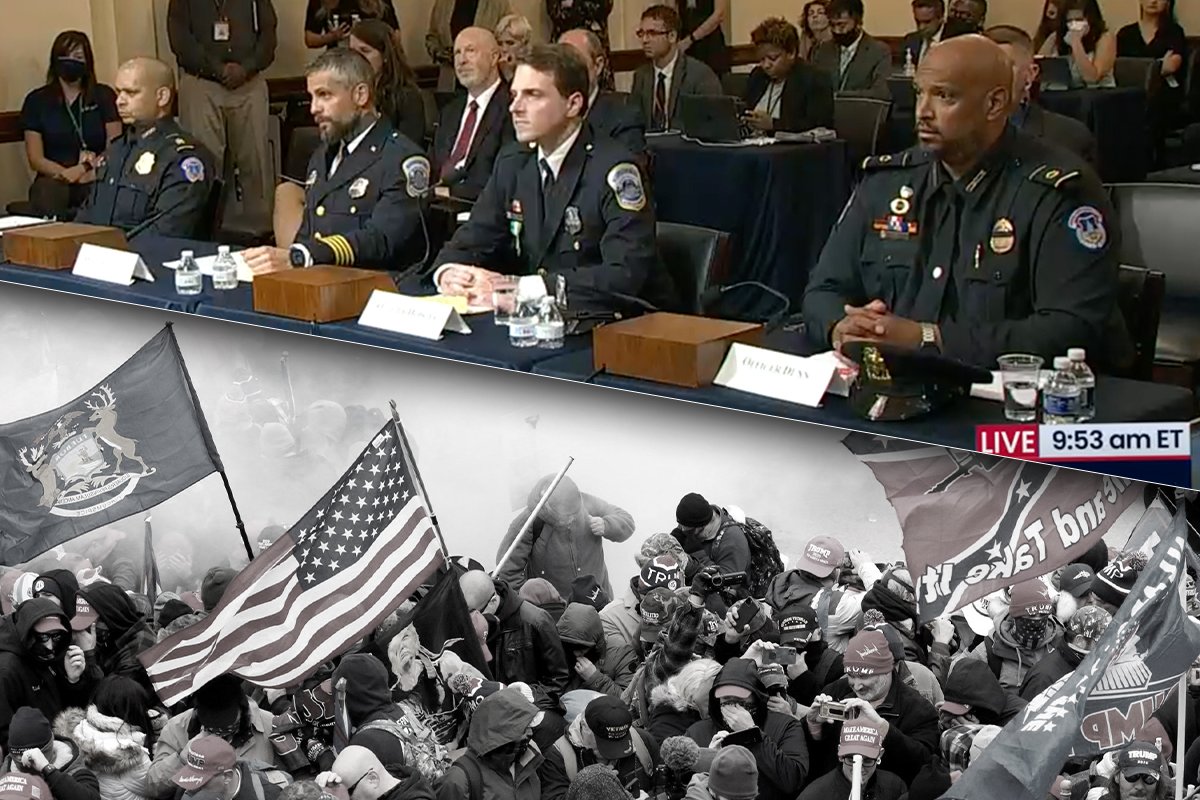
Four officers testified about their experiences on Jan. 6 to open investigative hearings by the House of Representatives, July 27, 2021. Photos courtesy of the US House of Representatives/Twitter.
While members of a mob shocked him repeatedly with a taser on Jan. 6, DC Metropolitan Police Officer Michael Fanone suffered a mild heart attack. But he knew that he couldn’t go for his gun because “that, in their minds, would provide their justification for killing me,” he said Tuesday.
Fanone and three other police officers who were at the US Capitol on Jan. 6 testified on the first day of hearings for the House Select Committee to Investigate the January 6th Attack on the United States Capitol. The House of Representatives is conducting the inquiry into the attack that followed the 2020 election on the building in which they make the nation’s laws.
All four officers described moments when they believed they might die; nonstop assaults with chemical, edged, and blunt-force weapons; and lingering injuries, both physical and psychological. All four laid the blame for the riot at the feet of former President Donald J. Trump. But they also said they were proud to have served their nation in defending the Capitol against the mob.
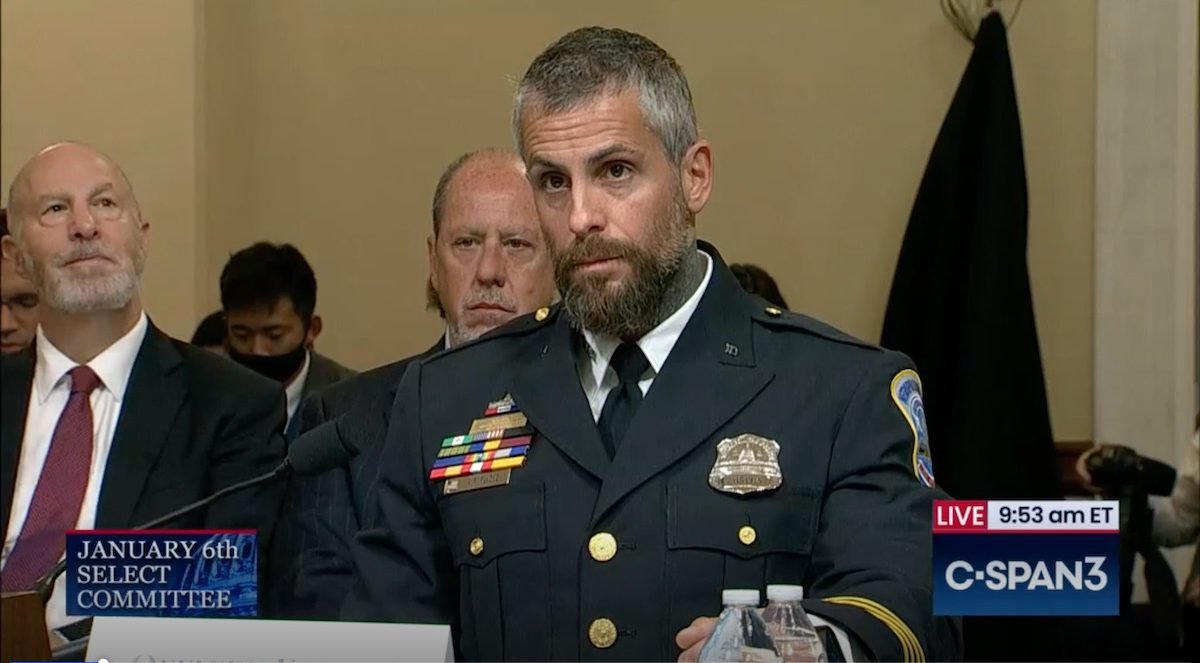
As protesters grabbed and punched Fanone, he screamed that he had kids, thinking of his four daughters and attempting to appeal to the mob’s sense of humanity, Fanone said. He heard someone scream, “I got one!” as attackers chanted, “Get his gun.” He felt his badge, radio, and ammunition ripped from his body as he was beaten with fists and “what felt like hard metal objects,” he said.
Finally, members of the crowd assisted him, inching him slowly back behind the line, where he remained unconscious for more than four minutes before his partner evacuated him. In addition to the heart attack diagnosis, he received diagnoses of a concussion, traumatic brain injury, and, later, post-traumatic stress.
Unlike members of the Capitol Police, Fanone did not work at the Capitol, he said, but he and his partner had run to help when the call had come at about 3 p.m., Jan. 6.
“Some have asked why we ran to help when we didn’t have to,” he said in a prepared statement. “I simply couldn’t ignore what was happening.”
Taunted by protesters as they walked toward the Capitol building, they ended up in a narrow hallway of the lower west terrace tunnel, where they supported a phalanx of 30 officers “holding back an onslaught of violent attackers” who were “nothing short of brutal.” As the officers yelled out to hold the line, Fanone said he thought to himself that “protecting a place I cared so much about was the most inspirational moment of my life.”
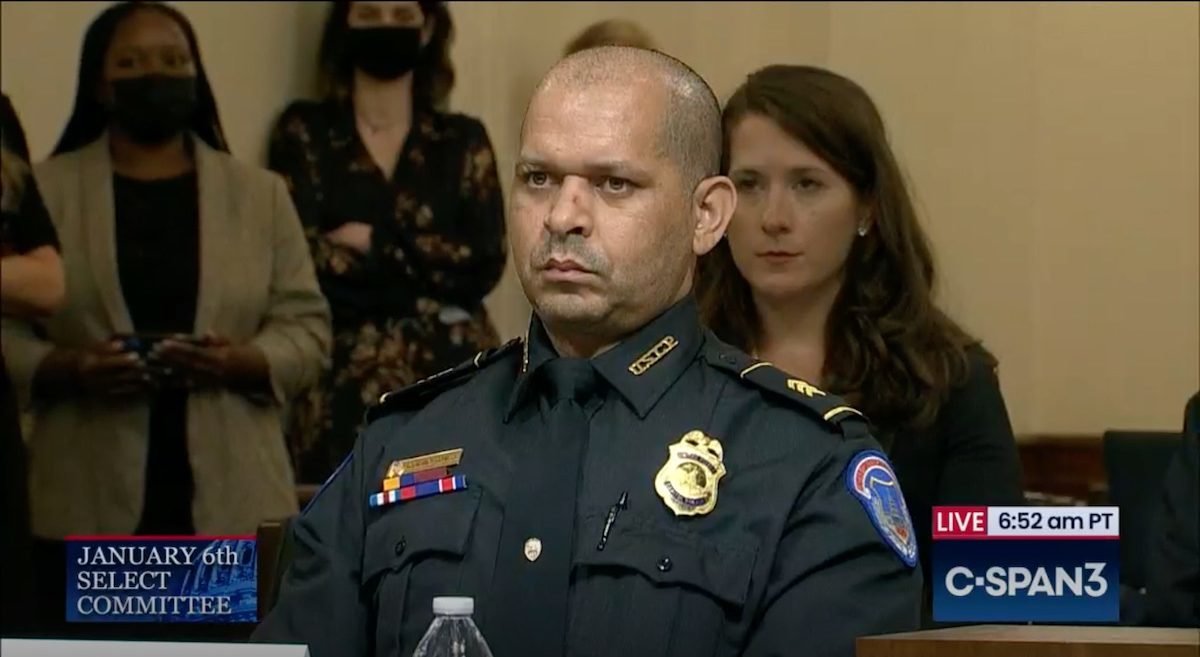
Capitol Police Sgt. Aquilino Gonell testified that, despite having spent a military deployment in Iraq conducting supply missions on IED-infested roads, he was more afraid on Jan. 6 at the Capitol than he ever was in Iraq. The weapons he faced, he told the committee, included chemical irritants, such as bear spray and pepper spray, hammers, rebar, knives, batons, and shields stolen from other law enforcement.
“It was like something from a medieval battle,” he testified. “Hand to hand, inch by inch.”
Gonell was berated by rioters and heard a variety of chants, he said. “I was falsely accused of betraying my oath, of choosing my paycheck over my loyalty to the US Constitution, even as I defended the very democratic process that protected everyone in that hostile crowd.” He was attacked with an American flag and heard people in the crowd shouting, “Trump sent us! Pick the right side!”
At one point, the crush of rioters made Gonell so short of oxygen that he thought he was going to die, he said.
When Gonell returned home late that night, he said, “I had to push my wife away from me, because she wanted to hug me. I told her no because of all the chemicals my uniform had on.”
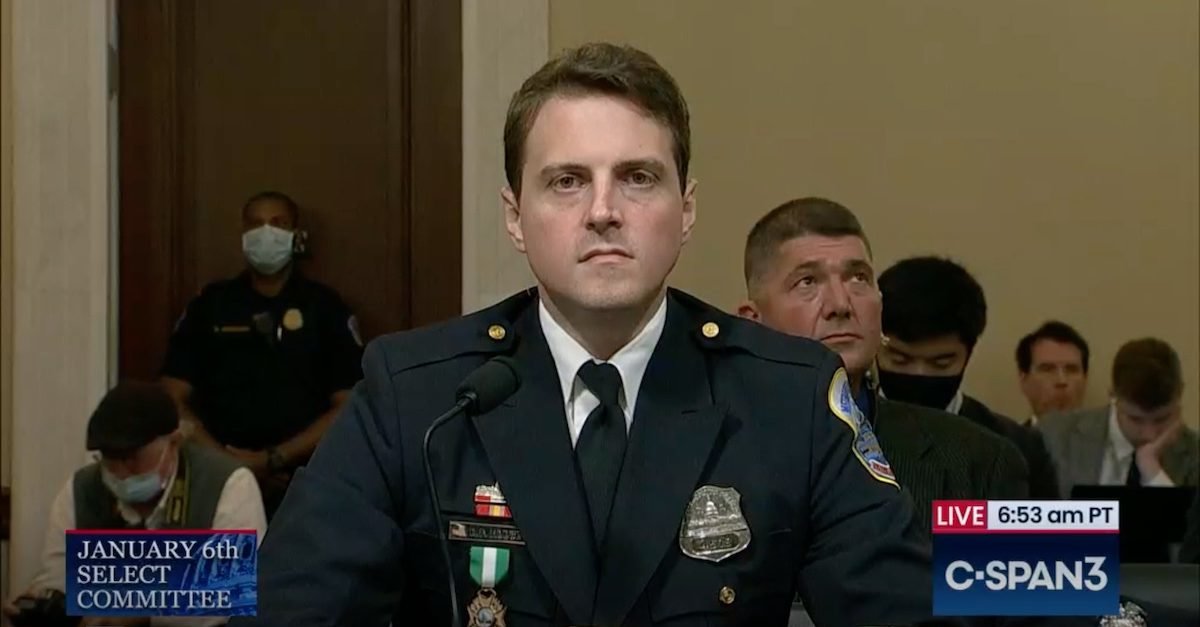
Daniel Hodges, an officer with DC Metro and an Army veteran, was separated from his team by the crowd and hit on the head by something heavy thrown from scaffolding above him, giving him a concussion. Someone pulled his mask over his eyes so he couldn’t see. After his platoon of police officers found him, he saw many flags, including one that read, “Jesus is my savior, Trump is my president.”
Hodges also noted multiple thin blue line flags, which he found incredibly ironic, as the crowd “ignored our commands and continued to assault us.”
Throughout his testimony, Hodges referred to the rioters as “terrorists.” At one point, he said, someone attempted to gouge out his eye with their thumb.
After entering the Capitol to wash chemical irritants off his face, Hodges said, another crowd trapped him against a door frame with a stolen police shield. He said he felt crushed as the crowd chanted, “Heave-ho!”
He also feared he might be “dragged into the crowd and lynched.” But a fellow officer pulled him out, and Hodges returned to the fray and did not leave the Capitol until 1 a.m., he said.
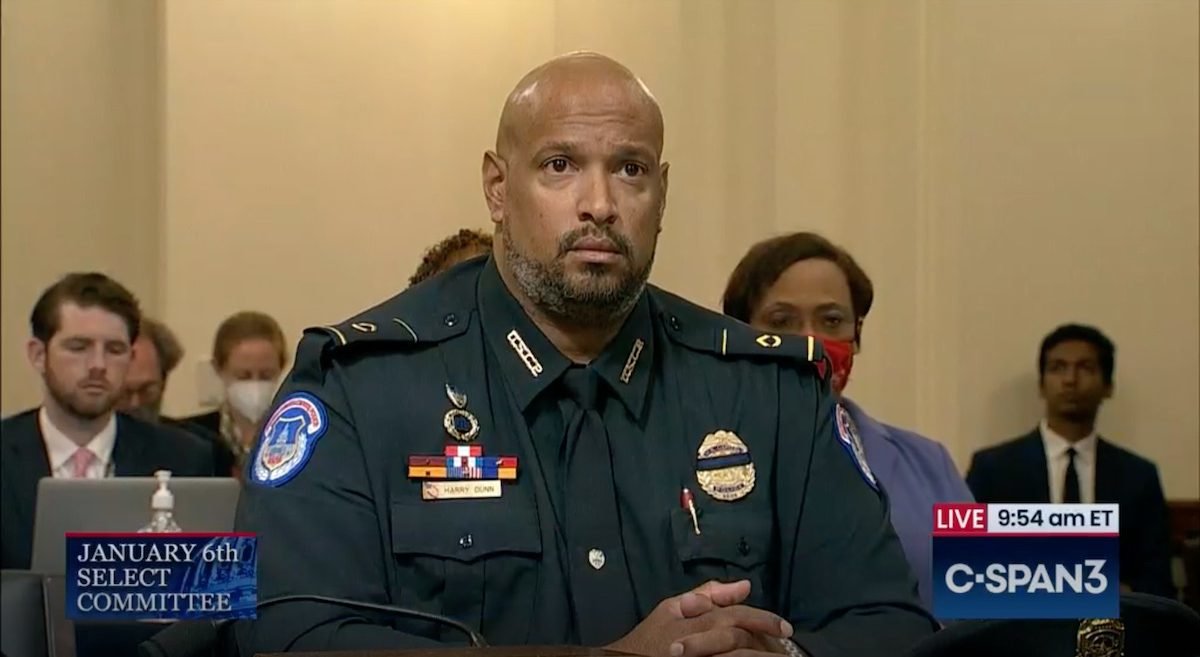
The final testimony came from Officer Harry Dunn of the Capitol Police, who told a harrowing story of being barraged with racial epithets. Making his way past “a sea of people in desperate hand-to-hand fighting across the west lawn,” Dunn, who is Black, provided decontamination aid to as many officers as he could and then rushed into the Capitol building.
Dunn was confronted by a crowd carrying various flags, including a Confederate flag, a Donald J. Trump campaign flag, and a “Don’t tread on me” flag. He could barely see from all the chemical spray in the air, he said.
One particularly ugly exchange occurred when Dunn tried to engage with a person who yelled that Trump “invited us here,” Dunn said. That person, Dunn said, told him, “Nobody voted for Joe Biden.”
Dunn said he had replied, “Well, I voted for Joe Biden. Does my vote not count? Am I nobody?”
Dunn reported that a woman in the crowd had shouted back, “You hear that, guys? This nigger voted for Joe Biden!”
The crowd then began to boo and chant, “Fucking nigger!”
“No one had ever, ever called me a nigger while wearing the uniform of a Capitol Police officer,” Dunn said to the committee. “To be candid, the rest of the afternoon is a blur. […] I was in shock and total disbelief.”
He told the committee that other Black officers later shared similar stories with him.
Dunn pointed the finger of blame firmly at Republicans who had not rejected Trump’s deliberate lies about the election. “It’s not a secret that it was political. They were literally there to ‘Stop the Steal.’ It was, and it is; there’s no getting around that,” Dunn said. “Telling the truth shouldn’t be hard.”
But Dunn finished his statement with a clear message of resilience. “Democracy went on that night and still continues to this day,” he said, referencing the congressional certification of the Electoral College vote count that was completed after the riot. “Democracy is bigger than any one person and any one party. You all tried to disrupt democracy that day, and you all failed.”
Fanone also said he was distressed by Republican leaders who had tolerated Trump’s lies. “I don’t think our response to the insurrection should have anything to do with political parties,” Fanone said. “Truly nothing has prepared me to address those elected members of our government who continue to deny the events of that day and in doing so, betray their oath of office. The indifference shown to my colleagues is disgraceful.”
He asked the committee to investigate any collaboration between what he referred to as violent insurrectionists and any members of the government.
“Regardless whether you’re a Republican, Democrat, Independent — when dispatch sends a call, before I treat you, we don’t ask, ‘Are you a Republican?’” Gonell said. “We don’t talk about politics. But this is bigger than that. We’re talking about people who claim they’re pro-law enforcement, and yet when they have the chance, the opportunity to hold people accountable, you pass the buck like nothing happened.”
Read Next:
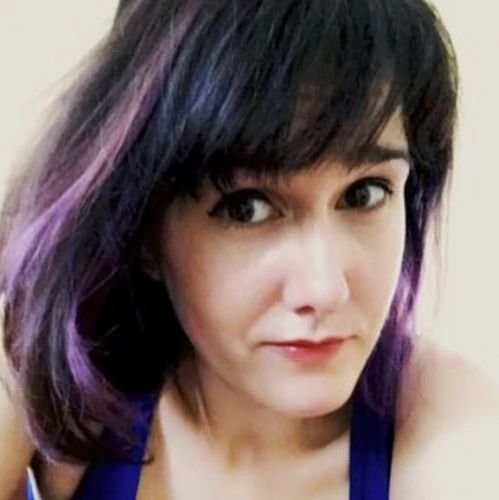
Maggie BenZvi is a contributing editor for Coffee or Die. She holds a bachelor’s degree in political science from the University of Chicago and a master’s degree in human rights from Columbia University, and has worked for the ACLU as well as the International Rescue Committee. She has also completed a summer journalism program at Northwestern University’s Medill School of Journalism. In addition to her work at Coffee or Die, she’s a stay-at-home mom and, notably, does not drink coffee. Got a tip? Get in touch!
BRCC and Bad Moon Print Press team up for an exclusive, limited-edition T-shirt design!
BRCC partners with Team Room Design for an exclusive T-shirt release!
Thirty Seconds Out has partnered with BRCC for an exclusive shirt design invoking the God of Winter.
Lucas O'Hara of Grizzly Forge has teamed up with BRCC for a badass, exclusive Shirt Club T-shirt design featuring his most popular knife and tiomahawk.
Coffee or Die sits down with one of the graphic designers behind Black Rifle Coffee's signature look and vibe.
Biden will award the Medal of Honor to a Vietnam War Army helicopter pilot who risked his life to save a reconnaissance team from almost certain death.
Ever wonder how much Jack Mandaville would f*ck sh*t up if he went back in time? The American Revolution didn't even see him coming.
A nearly 200-year-old West Point time capsule that at first appeared to yield little more than dust contains hidden treasure, the US Military Academy said.












